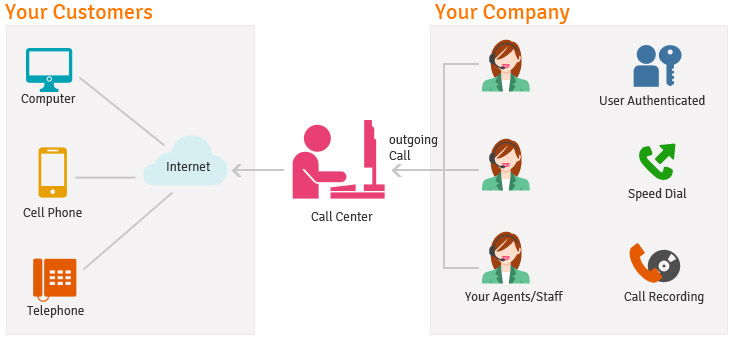Within a call centre, the main process is handling the telephone call. If an agent can give the customer all the information they require during the call without passing it to someone else, then this is usually known as ‘one and done’. The more calls that can be handled as ‘one and done’ the more efficient the process can be. In some centres, this is monitored as a way of measuring efficiency.
The call handling can be broken down into three steps – the first is the answering of the call by the ACD; the second is the time that an agent spends talking to the customer, and thirdly, the wrap time, which is anything that the agent has to do with the call after the customer hangs up. An agent will be measured on their talk time and their wrap time. Combined, these give an average call duration, which is a key statistic in the centre.

There are many factors which can impact the talk and wrap times. Here are some of the typical ones:
Talk Time
- Ability to control a conversation with a customer i.e. not letting them ramble on or being clear on how you explain things, so you don’t have to repeat yourself.
- Complexity of the customer requests.
- Level of knowledge or understanding of the customer.
- Efficiency in finding information on the computer.
- Efficiency in handling the process.
Wrap Time
- Ability to talk or listen and type information into the computer at the same time.
- Efficiency of the process.
- Keyboard or PC skills.
- Efficiency of the system.
Of the above, the agent’s own skills may be the determining factor – which ones might they be? Some people make the mistake that believing a long call makes customers happy and short calls don’t. This is not usually true. A customer wants several things. Firstly, that their call will be handled efficiently; secondly, that whatever it is that has been agreed will be done; and thirdly, that they will be spoken to in a polite and courteous way. All that an agent must ensure is that they deliver each of these things to ensure that the customer will be satisfied. At the end of the day it is the customer who, by buying the goods or service, is bringing money into the organisation, which enables them to employ the agents. In some situations, the agents will have to deal with unhappy or difficult customers. This can be for a variety of reasons, but the agent will still be expected to provide the right customer service even in a difficult situation. Most centres do have a process to deal with any rude or abusive customers, and it is critical to always follow this process and never to engage in reacting to the abuse no matter how hard it might be!
Multi-skilling
Multi-skilling is a term that you may hear in the centre. It relates to an agent who can undertake many different types of call whether they are inbound or outbound, sales and service, etc. It takes a lot of training to develop an agent to be multi-skilled, but in some centres where this happens, they may be rewarded or be of a different grade. Some centres do have a progression plan to develop agents to be multi-skilled as it provides them with a more flexible and rounded resource. It also provides the agents with a more interesting and challenging role!
Technology
Various electronic modes for handling customer calls are utilized and these include:
Fax – Telephone machine used to transpose the contents on paper from one destination to another through the use of the telephone.
E-mail – Electronic text mail. Here the response time is quicker and often immediate response to queries are generated.
Internet – Valuable, online information is readily available.
Cell Phones – SMS messages/alerts provide good customer service.
Telephone system:
ACD – Automatic Call Distributor – A specialised telephone system that evenly distributes telephone calls received, in an orderly fashion, via queues to agent groups. The caller would receive a welcome greeting and a message informing them which call centre they have dialled. If all the agents are busy, they will be advised that no resources are available and need to be patient as their call will be attended to as soon as an agent becomes available.
IVR- Interactive Voice Response – Also called a Voice Response unit. This unit responds to caller entered digits or speech recognition in much the same way that a conventional computer responds to keystrokes or the click of a mouse. This unit can be integrated with databases and the combination of the two units will enable the caller’s details to be launched at the agent’s PC monitor to speed up the process and complete the transaction.
Management Information Statistic Reports
These reports are a valuable source of keeping up to date with staff performance, service levels, targets met, calls handled, dropped calls, average talk times, etc. This allows better planning and management of resources.
Processes
The Telephony System plays a critical role in the call centre environment. Daily statistics are recorded for the following:
Talk Times - The time an agent spends on a call.
Abandoned Call - Also called a lost call. The caller hangs up before reaching an agent.
Call queue times - This refers to inbound calls that cannot be answered immediately and the caller is kept on the line whilst being presented with recorded announcements before being routed to the first available agent.
Service levels - Also referred to as the telephone service factor, or TSF.
This is the percentage of incoming calls that are answered within a specified time.